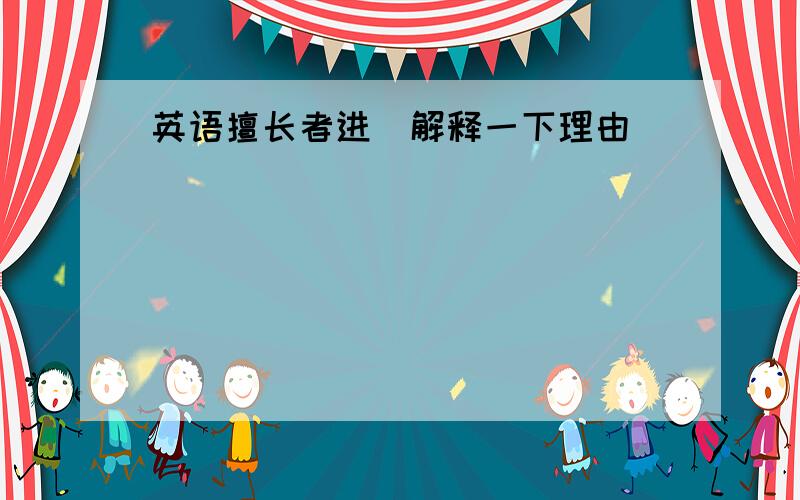英语擅长者进(解释一下理由)
来源:学生作业帮 编辑:神马作文网作业帮 分类:英语作业 时间:2024/11/11 07:17:21
英语擅长者进(解释一下理由)
1.————————the 2008 Olympic Games, lots of people in Beijing are learning English.
A.Greet BTo greet C Greeted D Greeting
2.Of the three men, one is a worker , _______two are teachers.
A.the others B. the other C others D.other
3.I didn"t think you liked tea.
I_______ but I _____now.
A.usedn"t; do B.did;don"t like C.didn"t ;can D.usedn"t to ; do
4.The population of China is ______ than _______of Canada.
A.more, it B.more;that C.large;it D.larger ;that
5.________of us has an English-Chinese dictionary.
A.Every B.All C.Each D.Everyone
6.Is everything_____________________ we need to do __________?
Yes . You needn"t worry about it.
A.which; has done B.which; doing C.that ;has done D.that; done
7.The experts think that India's population may be _______________ than China's ______________2020.
A.more; by B.more;in C.larger;by D.larger; on
8.Li lei also sits________me ________Wang Hai. (用beside或besides填空)
9.I——————————————————— used to things, and don't find them so strange _______.
A./; after all B. am getting; at all C.am getting; any more D./; any more
10.What are you going to do in the English party?
Oh, we are going to ________ a short English play.
A. put on B. put away C.put up
11.It was a long journey,but _____ of them four felt bored.
A.neither B both C. none D.all
12.My father stopped working when he was sixty years old. (同义句转换)
My father ____________ _________________working ___________ ______________ _____ _________ sixty.
1.————————the 2008 Olympic Games, lots of people in Beijing are learning English.
A.Greet BTo greet C Greeted D Greeting
2.Of the three men, one is a worker , _______two are teachers.
A.the others B. the other C others D.other
3.I didn"t think you liked tea.
I_______ but I _____now.
A.usedn"t; do B.did;don"t like C.didn"t ;can D.usedn"t to ; do
4.The population of China is ______ than _______of Canada.
A.more, it B.more;that C.large;it D.larger ;that
5.________of us has an English-Chinese dictionary.
A.Every B.All C.Each D.Everyone
6.Is everything_____________________ we need to do __________?
Yes . You needn"t worry about it.
A.which; has done B.which; doing C.that ;has done D.that; done
7.The experts think that India's population may be _______________ than China's ______________2020.
A.more; by B.more;in C.larger;by D.larger; on
8.Li lei also sits________me ________Wang Hai. (用beside或besides填空)
9.I——————————————————— used to things, and don't find them so strange _______.
A./; after all B. am getting; at all C.am getting; any more D./; any more
10.What are you going to do in the English party?
Oh, we are going to ________ a short English play.
A. put on B. put away C.put up
11.It was a long journey,but _____ of them four felt bored.
A.neither B both C. none D.all
12.My father stopped working when he was sixty years old. (同义句转换)
My father ____________ _________________working ___________ ______________ _____ _________ sixty.

1.B to表目的
2.B the other表两部分中另一部分
3.D used to过去常常,do指的是like tea
4.D 比较级,人口用larger,that指The population of Canada,it是指前面提到的事,是唯一的
5.C has表单数,故用each,everyone是代词,后面有us,故不选D
6.D is提前了,故用done,宾语重句里有不定代词用that
7.C 人口用larger,by,在···之前
8.beside;besides beside在···旁和动词连用,构成介词短语,besides,除了
9.B get used to,习惯于,after all,毕竟,not at all,根本不,not any more,不再,要理解句意!
10.A put on有很多意思,此句中译为上演
11.C them four是四个人,用none或all,理解句意,“路途很长,但他们四个中没人很累”,表否定,故用none
12.didn't,stop,until,he,was 注意:注意观察时态,not···until···,直到···才···.
Wish you a happy New Year!
2.B the other表两部分中另一部分
3.D used to过去常常,do指的是like tea
4.D 比较级,人口用larger,that指The population of Canada,it是指前面提到的事,是唯一的
5.C has表单数,故用each,everyone是代词,后面有us,故不选D
6.D is提前了,故用done,宾语重句里有不定代词用that
7.C 人口用larger,by,在···之前
8.beside;besides beside在···旁和动词连用,构成介词短语,besides,除了
9.B get used to,习惯于,after all,毕竟,not at all,根本不,not any more,不再,要理解句意!
10.A put on有很多意思,此句中译为上演
11.C them four是四个人,用none或all,理解句意,“路途很长,但他们四个中没人很累”,表否定,故用none
12.didn't,stop,until,he,was 注意:注意观察时态,not···until···,直到···才···.
Wish you a happy New Year!